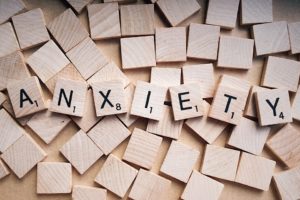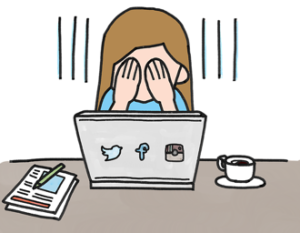What is social anxiety?
 Social anxiety is anxiety related to social events and interactions. The specific difficulties of individuals who struggle with this are idiosyncratic, however, common difficulties include:
Social anxiety is anxiety related to social events and interactions. The specific difficulties of individuals who struggle with this are idiosyncratic, however, common difficulties include:
- Feeling on edge and nervous when with strangers
- Avoiding social situations
- Feeling watched or judged
- Behaviours designed to ‘fit in’ or make the person ‘invisible’
- Experiencing physical symptoms such as nausea and sweating when thinking about past and future social activities
- Fear of making a ‘fool’ of oneself
- Rituals or substances can be used to manage the anxiety, for example, excessive alcohol consumption during social events
- In extreme circumstances, a total avoidance of leaving a perceived safe place such as home
Social anxiety can also be limited to specific situations such as public speaking or meeting someone new.
Where does social anxiety come from?
Social anxiety usually starts before adulthood. It may be traceable to a specific event such as bullying or being pressured to take part in a drama production. It may also have resulted from a build-up of different factors such as low self – esteem, turbulent friendships and parental or societal emphasis on appearances and success.
What is status anxiety and how does it differ from social anxiety?
Status anxiety (de Botton, 2005) is the common fear of judgement from other people regarding our own level of success while simultaneously being envious for their successes. Status anxiety can contribute to social anxiety. All people fear, to a greater or lesser extent, how others perceive them and worry about how to present themselves to the world. Historically, neighbours, friends and family  members may have experienced status anxiety in a ‘keeping up with the Joneses’ way: wanting to be perceived as having the best possessions or lifestyle.
members may have experienced status anxiety in a ‘keeping up with the Joneses’ way: wanting to be perceived as having the best possessions or lifestyle.
More recently, with the introduction of social media, status anxiety can be triggered by viewing other people’s posts, photos and updates. Social media enables people to present themselves however they desire, which can cause their viewers to negatively evaluate their own lives.
This anxiety regarding status is a common part of human life, however, if this starts to impact upon daily life it may be beneficial to seek support.
When to seek help for social or status anxiety
Most people experience minor social anxiety or problems with status anxiety at some point during their lives and will not need to seek help for this. However, if your anxiety is impacting upon your daily life or inhibiting you from achieving something you would like, such as  a promotion, it may be time to seek help. Depending on your specific difficulties, therapy could help you to:
a promotion, it may be time to seek help. Depending on your specific difficulties, therapy could help you to:
- Boost your confidence and self esteem
- Challenge your negative thoughts relating to your own worth and abilities
- Consider the impact of your social media usage
- Slowly increase your tolerance of social situations
- Learn techniques to stay calm during social situations
- Consider the origins of your social anxiety and any specific interventions required for this
Reference
de Botton, A. (2005). Status Anxiety. Penguin Books.
